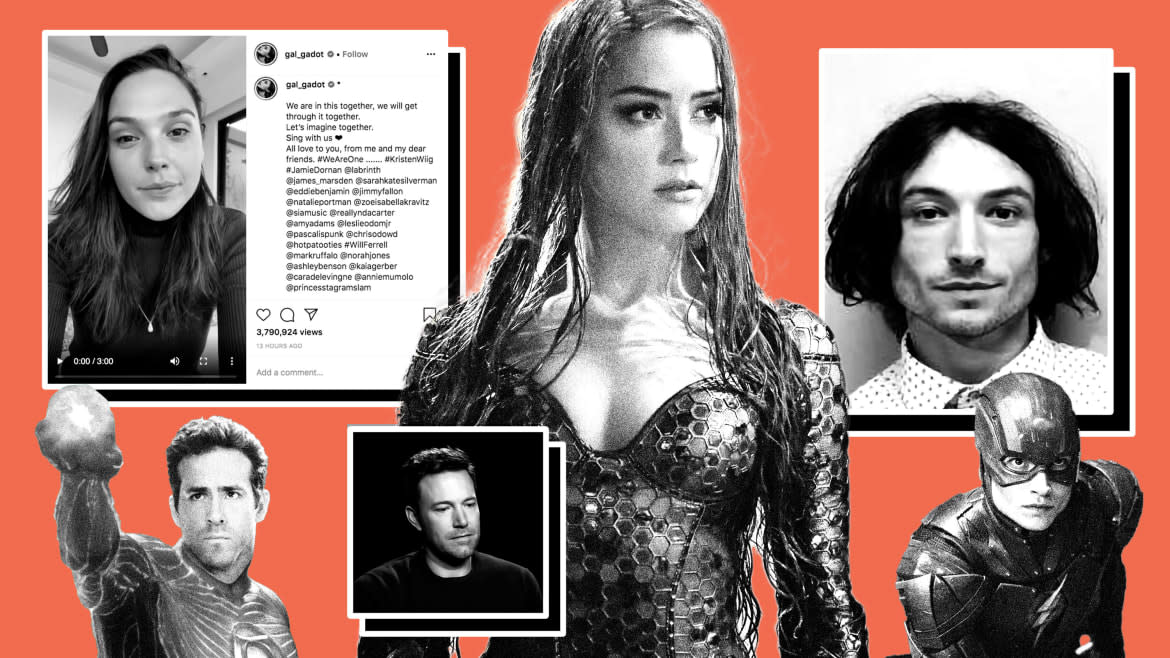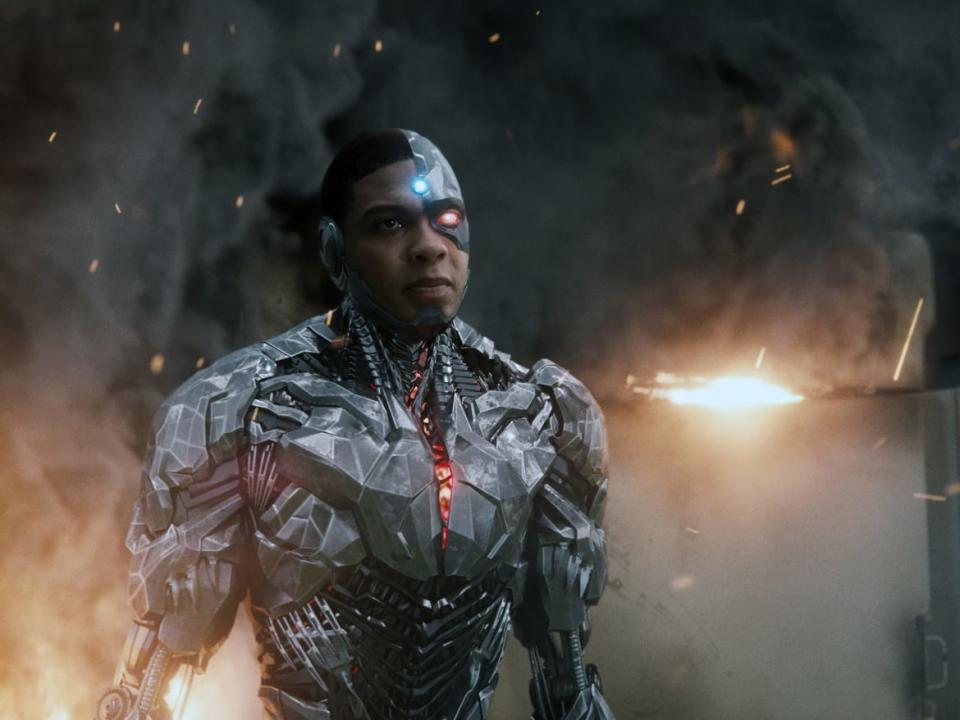The DC Cinematic Universe Can’t Outrun Its Casting Curse

A movie based on the Flash, starring Ezra Miller as the titular, hypersonic DC superhero, is scheduled to hit theaters 13 months from now. Everything was going according to plan—trailers have been hitting the internet, a comic book tie-in is set to be printed—until it suddenly wasn’t.
Earlier this spring, Miller racked up an impressive suite of criminal charges, including disorderly conduct, harassment, and second-degree assault in the midst of one of the strangest career-altering fiascos in recent celebrity memory. For the last several weeks, news has trickled out of Hawaii, where all of these incidents occurred, painting Miller as an unhinged, Joker-like supervillain terrorizing the denizens of the islands.
In March, the actor was booked for “yelling obscenities” at the patrons of a karaoke bar, and allegedly “lunging” towards a man who was playing darts. (A high-risk maneuver! Miller pleaded no contest.) A month later, the actor apparently tossed a chair at a woman attending a private get-together, leaving a gash on her forehead.
This wasn’t even the first time Miller was in the news for alleged assault, either. Last April, videos of them apparently choking a woman surfaced online—timed just before the release of HBO Max’s buzzy Zack Snyder’s Justice League, a.k.a. “The Snyder Cut.”
Three strikes and Miller may be out, however, with reports following that DC may have paused any future projects with the actor.
All of this has left Warner Bros. in yet another unfortunate predicament. Tasked with bringing DC to the big screen, the studio has spent decades attempting to conjure the same international resonance and oodles of box-office cash generated by MCU for its own high-value pantheon of superheroes. And now, its latest high-profile attempt is held hostage by a very public meltdown—one which might potentially doom years of billion-dollar franchise-building.
It’s a contingency that nobody could’ve prepared for. And if you’ve followed DC's recent film endeavors closely, you know that there’s always another catastrophe right around the corner.
‘The Flash’ Fans Want Grant Gustin to Replace Ezra Miller: He’s Not ‘a Psychopath’
Where do you even start with these setbacks? I tend to think the original sin was the 2011 Green Lantern adaptation: a turgid mess that barely broke even and bombed critically. The failure sent the entire DC brass back to the drawing board, causing Ryan Reynolds to defect across the hall, where he stepped inside the Deadpool suit and brought a truckload of bucks to Sony's overflowing coffers.
Meanwhile, Warner Bros. attempted to rebrand the DC universe with the help of perpetually moody Zach Snyder, who was hired to bless the canon with his trademark dour, funereal candor. The result? 2013’s utterly vibeless Man of Steel, followed by Batman v Superman, which racked up a horrendous 29 percent on Rotten Tomatoes. More importantly, it gave us an immortal Ben Affleck meme during the press tour—which documents his reaction when he learns, to his horror, that the film is receiving “mixed reviews.” (Affleck would only play Batman one more time before leaving the DC ecosystem entirely.)
This was all meant to culminate with 2017’s Justice League, an intra-universe mashup of every iconic figure in the DC cosmology, as a way to shock the listless franchise into relevance. Warner Bros. initially had Snyder on the shoot, but he stepped away from the film in post-production, following the tragic death of his daughter.
The production swapped in Joss Whedon, who successfully integrated a sense of chiming, familial levity into The Avengers five years prior. He scrapped nearly everything with a slew of reshoots, forging Justice League into a slick, banter-heavy romp, which completely evaporated upon impact and left seemingly everyone involved feeling terminally unsatisfied.

Ray Fisher as Cyborg in Justice League. After the film's release, Fisher spoke out against pinch-hitter director Joss Whedon, whom Fisher alleged was "abusive" toward cast and crew on set.
The controversy continued well after that movie’s release.
Ray Fisher, who played Cyborg, reportedly had a massive falling-out with studio executives, and Whedon in particular, who he claimed to be exceedingly unprofessional and abusive. And Fisher wasn’t alone. A number of his Justice League colleagues corroborated his accusations.
In 2020, Whedon was accused of workplace harassment by several former collaborators, including Buffy The Vampire Slayer star Michelle Trachtenberg who said there was a rule on set that she could not be alone with Whedon. Trachtenberg was a teenager during the heights of Buffy, so the implications of that accusation are chilling. After burning nearly all of his bridges—not to mention earning the scorn of critics and fans alike for the film—it was clear that Whedon would not be handling any more DC enterprises.
I don’t know if Warner Bros. decision-makers were aware of Whedon’s reputation before bringing him in for Justice League, but DC’s spotty track record of participants speaks for itself.
We already covered Ezra Miller, menace of Maui. There’s Amber Heard, who co-stars as Mera in the actually-pretty-good Aquaman and is currently being brigaded by a legion of radicalized, conspiratorial Johnny Depp fans. (Every day, they break down the ticker tape of the trial between the two with a near-QAnon level of fastidiousness.)
Additionally, Gal Gadot, best known as Wonder Woman, is responsible for the “Imagine” video —which is perhaps the single most bizarre relic of the early pandemic era. And we mustn’t forget director Todd Phillips, who made some outstandingly dumb comments about cancel culture and briefly derailed the discourse surrounding the also-actually-pretty-good Joker.
There’s a revealing identity crisis here. It’s that Marvel films tend to either be simply good or simply bad, with little behind-the-scenes dirt coloring the action on screen. DC, on the other hand, is all drama all the time. You need to be familiar with reams of aggrieved Reddit fan theories to comprehend why a “Snyder Cut” was necessary for Justice League in the first place. In that sense, the DCEU is just as strained and convoluted as the average comic book story.
It’s especially striking when we consider how much more iconic DC’s stable is. Honestly, we’ve become sorta numb to Marvel's unprecedented cultural dominance. The idea that Iron Man—of all characters!—would somehow become more beloved than Superman was utterly unthinkable as recently as, like, 2005.
The MCU flexes harder with each passing year, undertaking increasingly audacious marketing challenges, to the point that it’s able to transform Rocket Raccoon and Moon Knight into household names. (I can only assume a Squirrel Girl series is right around the corner.) DC, meanwhile, has a century’s worth of Batman stories to pull from and still can’t get out of its own way.

Jason Momoa (left) and Amber Heard as Aquaman and Mera in 2018's Aquaman. The sequel is due out in March 2023, but Heard recently said that her role has been greatly reduced due to her legal battles against ex-husband Johnny Depp.
You can say that Marvel has gotten lucky; after all, it doesn’t have to contain a rampaging neighborhood agitator who will soon play one of their premiere superheroes. (All that Disney money surely helps, too.) But the MCU has also absorbed a watershed royalties lawsuit from Scarlett Johansson, a couple of really bad films, and—most prominently—the literal death of Chadwick Boseman, who starred in the greatest Marvel movie ever made.
The MCU has persevered on the strength of its brand’s pure power, while DC is stuck in the mud, with WB wondering if it needs to recast The Flash in The Flash.
I think that the moral here is that cinematic universes were probably never meant to be. The MCU is an unprecedented feat of meta-storytelling, engineered by a ravenous fanbase, suffocating contracts, and a genuine star-making machine at its core. So many things needed to go right for Marvel to reach its grandeur, and perhaps we should not be surprised when the house of cards inevitably tumbles down. (Remember the Dark Universe?)
‘Zack Snyder’s Justice League’ Will Delight DC’s Toxic Fans
The DCEU is in tumult, meanwhile, because The Flash is in tumult. The Miller drama will naturally lead to countless other consequences down the line, as Warner Bros. keeps bloating the maw with extrapolative content. The exigencies grow only murkier as the tendrils expand, and someday soon I’m sure the MCU too will be thrown into chaos due to factors outside of their control—the man cast to play Galactus bringing a gun to a nightclub or some such thing.
Some of the greatest genre movies ever made were condensed to a trilogy, including the best stories of the Dark Knight himself. And I don’t think anyone is surprised that the DC entries that have existed outside of the canopy (Joker, The Batman, and so on) have been relative runaway successes. I’m sure there’s a lot of frustration inside Warner Bros. as it stares at the ever-encroaching release tempo, hoping that Miller doesn’t debase themselves again before the movie’s trailer debut.
But maybe this will also provoke a memory of how movies used to be before everything was in service towards a half-dozen interrelated sequels already in the pipeline. Maybe all you ever really needed was a superhero and a supervillain, even if that villain is Gorilla Grodd.
Get the Daily Beast's biggest scoops and scandals delivered right to your inbox. Sign up now.
Stay informed and gain unlimited access to the Daily Beast's unmatched reporting. Subscribe now.


